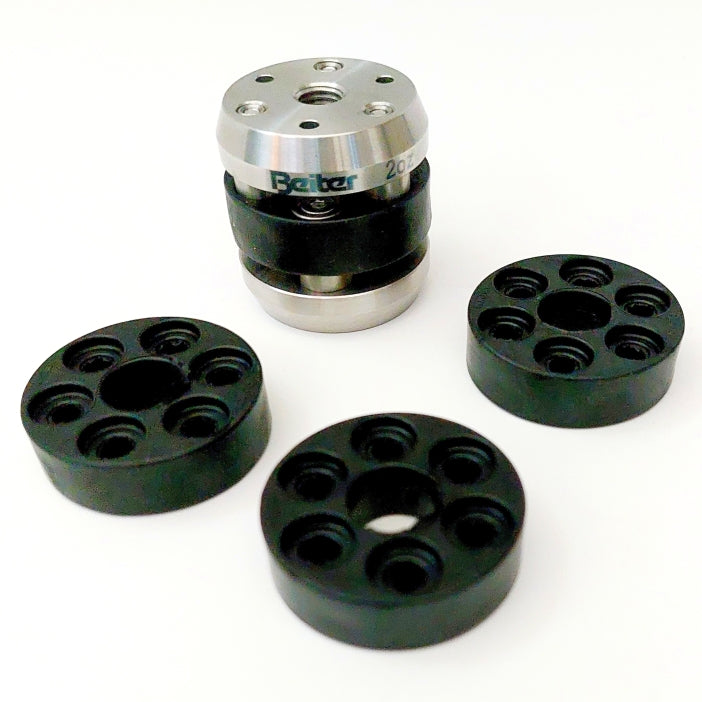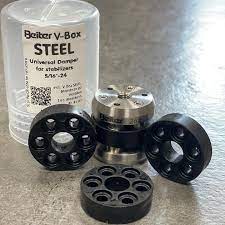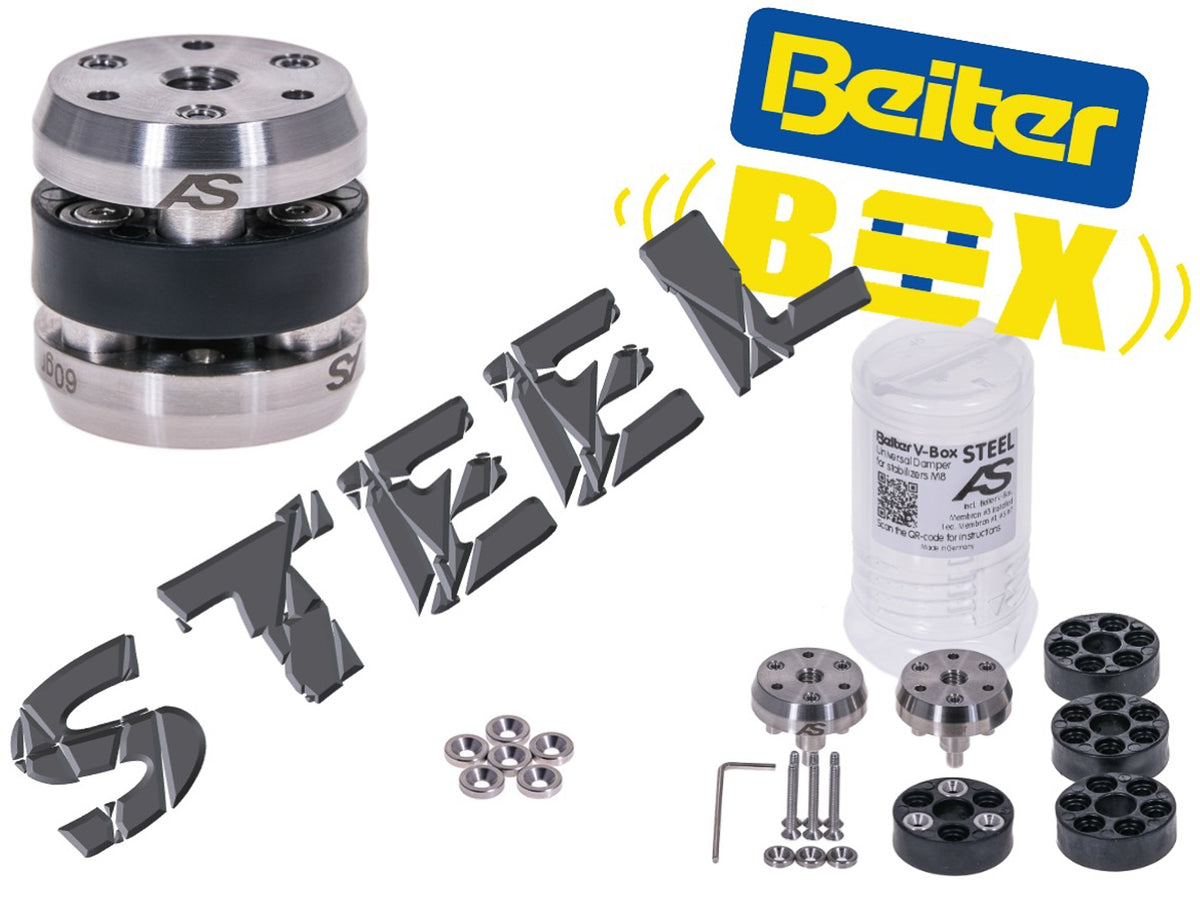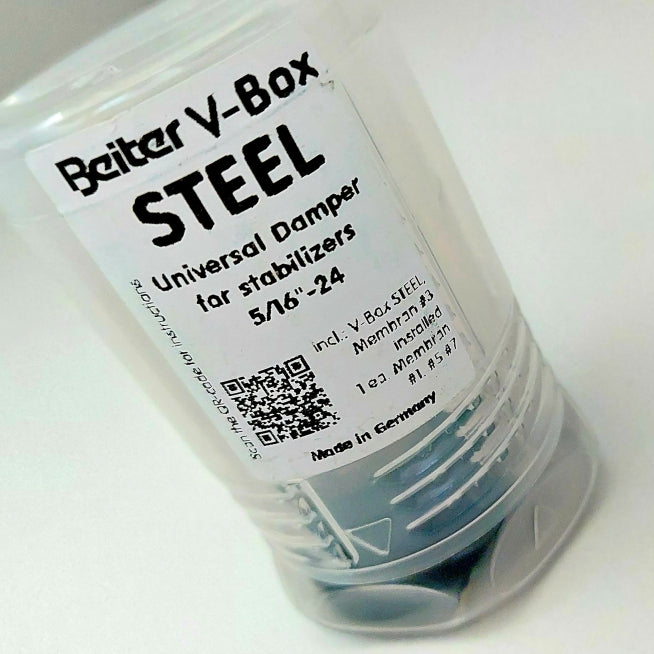BEITER V-BOX STEEL is a multifunctional dampening system for bow stabilizers, the heaviest version of the original BEITER V-BOX. The stiffness of the BEITER V-BOX can be changed by the different membranes (the piece in the center of the damper). This system will be complete with weights and spacers to personalize your stabilizers and feedback style.
V-BOX STEEL fits ALL STABILIZERS & WEIGHTS with 5/16”-24 threads. Metric threads needed? See our French partner www.arc-systeme.fr to get the BEITER V-BOX STEEL M8!
STAINLESS STEEL makes our system stiffer. That allows a heavier total weight in front of the BEITER V-BOX. See technical facts to learn more about your next set up.
DENSITY: save 1 inch to increase density on your stabilizer! (25mm = 5 oz weight)
What’s in the box?
Technical facts:
Total weight : 5.10 oz (145 grams).
Diameter : 32mm.
Length : 35mm.
Maximum weight allowed on membranes :
#1 : 6 oz (180 grams).
#3 : 10 oz (300 grams).
#5 : 16 oz (450 grams).
#7 : 25 oz (710 grams).
How does the BEITER V-BOX work?
Not all stabilizers have the same properties as stiffness. Archers may feel how their stabilizing system reacts depending on many parameters like bow, cams, string material, other dampening system, bow weight and poundage, draw length. BEITER’s system is able to adapt vibrations and feedback on the archer’s needs. V-BOX works on the inertia: too much comfort is an enemy for accuracy, and too much stiffness can hurt the archer due to high vibration rate. The movement created by the shot is vertical and horizontal, BEITER V-BOX is the solution to find the best compromise between comfort and accuracy, without pain.
Where is the best location for V-BOX?
Weights can be mounted in front or behind the V-BOX. An optimal setup will involve placing weights on both sides of the V-BOX. To obtain the best setup, some rules must be applied to let it work perfectly.
Colored spacers (accessories).
Colored plastic spacers can change the stabilizers balance: you may fix a spacer instead of a weight disc to lighten the overall bow weight, without changing the general distribution, but having a lever effect on the balance. The dampening will change as well. Countless combinations are available with the V-BOX, tuning and customizing, to fit your needs.
Advices.
V-BOX STEEL fits ALL STABILIZERS & WEIGHTS with 5/16”-24 threads. Metric threads needed? See our French partner www.arc-systeme.fr to get the BEITER V-BOX STEEL M8!
STAINLESS STEEL makes our system stiffer. That allows a heavier total weight in front of the BEITER V-BOX. See technical facts to learn more about your next set up.
DENSITY: save 1 inch to increase density on your stabilizer! (25mm = 5 oz weight)
What’s in the box?
- The V-BOX STEEL with membrane #3.
- Membranes #1, #5 & #7.
- Stainless steel washers.
- One Allen key #2.
Technical facts:
Total weight : 5.10 oz (145 grams).
Diameter : 32mm.
Length : 35mm.
Maximum weight allowed on membranes :
#1 : 6 oz (180 grams).
#3 : 10 oz (300 grams).
#5 : 16 oz (450 grams).
#7 : 25 oz (710 grams).
How does the BEITER V-BOX work?
Not all stabilizers have the same properties as stiffness. Archers may feel how their stabilizing system reacts depending on many parameters like bow, cams, string material, other dampening system, bow weight and poundage, draw length. BEITER’s system is able to adapt vibrations and feedback on the archer’s needs. V-BOX works on the inertia: too much comfort is an enemy for accuracy, and too much stiffness can hurt the archer due to high vibration rate. The movement created by the shot is vertical and horizontal, BEITER V-BOX is the solution to find the best compromise between comfort and accuracy, without pain.
Where is the best location for V-BOX?
Weights can be mounted in front or behind the V-BOX. An optimal setup will involve placing weights on both sides of the V-BOX. To obtain the best setup, some rules must be applied to let it work perfectly.
Colored spacers (accessories).
Colored plastic spacers can change the stabilizers balance: you may fix a spacer instead of a weight disc to lighten the overall bow weight, without changing the general distribution, but having a lever effect on the balance. The dampening will change as well. Countless combinations are available with the V-BOX, tuning and customizing, to fit your needs.
Advices.
- Do not use a too soft membrane. The V-BOX must not bend under the weight: choose a stiffer membrane.
- Maximum weight advised for membranes #5 and #7, 12 and 15 oz in front, respectively.
- Maximum weight allowed by the BEITER V-BOX STEEL is 30 oz (850 grams).
- Always use a BEITER Ground Plate (available in 30/20mm, 30/23mm or 30/26mm) or conic base ARC SYSTEME (M8 version) to connect the stabilizer to his weights: not only cosmetic fact, it concerns the quality of vibrations transmission toward the end of the rod.
- Gallery
- Description




BEITER V-BOX STEEL is a multifunctional dampening system for bow stabilizers, the heaviest version of the original BEITER V-BOX. The stiffness of the BEITER V-BOX can be changed by the different membranes (the piece in the center of the damper). This system will be complete with weights and spacers to personalize your stabilizers and feedback style.
V-BOX STEEL fits ALL STABILIZERS & WEIGHTS with 5/16”-24 threads. Metric threads needed? See our French partner www.arc-systeme.fr to get the BEITER V-BOX STEEL M8!
STAINLESS STEEL makes our system stiffer. That allows a heavier total weight in front of the BEITER V-BOX. See technical facts to learn more about your next set up.
DENSITY: save 1 inch to increase density on your stabilizer! (25mm = 5 oz weight)
What’s in the box?
Technical facts:
Total weight : 5.10 oz (145 grams).
Diameter : 32mm.
Length : 35mm.
Maximum weight allowed on membranes :
#1 : 6 oz (180 grams).
#3 : 10 oz (300 grams).
#5 : 16 oz (450 grams).
#7 : 25 oz (710 grams).
How does the BEITER V-BOX work?
Not all stabilizers have the same properties as stiffness. Archers may feel how their stabilizing system reacts depending on many parameters like bow, cams, string material, other dampening system, bow weight and poundage, draw length. BEITER’s system is able to adapt vibrations and feedback on the archer’s needs. V-BOX works on the inertia: too much comfort is an enemy for accuracy, and too much stiffness can hurt the archer due to high vibration rate. The movement created by the shot is vertical and horizontal, BEITER V-BOX is the solution to find the best compromise between comfort and accuracy, without pain.
Where is the best location for V-BOX?
Weights can be mounted in front or behind the V-BOX. An optimal setup will involve placing weights on both sides of the V-BOX. To obtain the best setup, some rules must be applied to let it work perfectly.
Colored spacers (accessories).
Colored plastic spacers can change the stabilizers balance: you may fix a spacer instead of a weight disc to lighten the overall bow weight, without changing the general distribution, but having a lever effect on the balance. The dampening will change as well. Countless combinations are available with the V-BOX, tuning and customizing, to fit your needs.
Advices.
V-BOX STEEL fits ALL STABILIZERS & WEIGHTS with 5/16”-24 threads. Metric threads needed? See our French partner www.arc-systeme.fr to get the BEITER V-BOX STEEL M8!
STAINLESS STEEL makes our system stiffer. That allows a heavier total weight in front of the BEITER V-BOX. See technical facts to learn more about your next set up.
DENSITY: save 1 inch to increase density on your stabilizer! (25mm = 5 oz weight)
What’s in the box?
- The V-BOX STEEL with membrane #3.
- Membranes #1, #5 & #7.
- Stainless steel washers.
- One Allen key #2.
Technical facts:
Total weight : 5.10 oz (145 grams).
Diameter : 32mm.
Length : 35mm.
Maximum weight allowed on membranes :
#1 : 6 oz (180 grams).
#3 : 10 oz (300 grams).
#5 : 16 oz (450 grams).
#7 : 25 oz (710 grams).
How does the BEITER V-BOX work?
Not all stabilizers have the same properties as stiffness. Archers may feel how their stabilizing system reacts depending on many parameters like bow, cams, string material, other dampening system, bow weight and poundage, draw length. BEITER’s system is able to adapt vibrations and feedback on the archer’s needs. V-BOX works on the inertia: too much comfort is an enemy for accuracy, and too much stiffness can hurt the archer due to high vibration rate. The movement created by the shot is vertical and horizontal, BEITER V-BOX is the solution to find the best compromise between comfort and accuracy, without pain.
Where is the best location for V-BOX?
Weights can be mounted in front or behind the V-BOX. An optimal setup will involve placing weights on both sides of the V-BOX. To obtain the best setup, some rules must be applied to let it work perfectly.
Colored spacers (accessories).
Colored plastic spacers can change the stabilizers balance: you may fix a spacer instead of a weight disc to lighten the overall bow weight, without changing the general distribution, but having a lever effect on the balance. The dampening will change as well. Countless combinations are available with the V-BOX, tuning and customizing, to fit your needs.
Advices.
- Do not use a too soft membrane. The V-BOX must not bend under the weight: choose a stiffer membrane.
- Maximum weight advised for membranes #5 and #7, 12 and 15 oz in front, respectively.
- Maximum weight allowed by the BEITER V-BOX STEEL is 30 oz (850 grams).
- Always use a BEITER Ground Plate (available in 30/20mm, 30/23mm or 30/26mm) or conic base ARC SYSTEME (M8 version) to connect the stabilizer to his weights: not only cosmetic fact, it concerns the quality of vibrations transmission toward the end of the rod.




